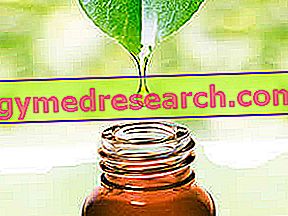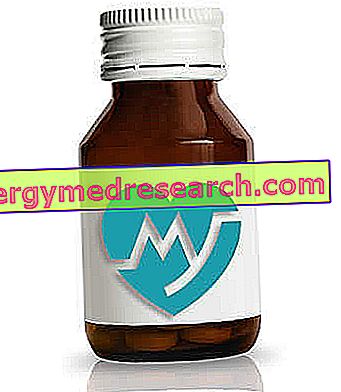Generality
General information on meteorism
As widespread as it is unpleasant and embarrassing, meteorism outlines a dysfunction of the gastrointestinal tract, characterized by abdominal distension, the result of an accumulation of gas in the stomach and intestines.

It is no coincidence that excess gas, which is abdominal swelling and spasm, often occurs immediately after a meal, since meteorism is heavily influenced by the diet and the way in which it is eaten.
Causes of meteorism
Numerous and manifold are the causes that give rise to meteorism: aerophagia, unbalanced food rich in foods that form gas (legumes, carbonated soft drinks, artificial sweeteners), alteration of intestinal gas absorption (caused by pathologies affecting the liver and intestines), irritable bowel syndrome.
Did you know that ...
Meteorism can hide more serious pathologies, such as appendicitis, celiac disease, renal colic, cystic fibrosis, viral gastroenteritis, lactose intolerance, peritonitis: this is why "chronic" meteorism should alarm and prompt the patient to consult a doctor for differential diagnosis .
Symptoms of meteorism
Typical of meteorism are symptoms such as abdominal distention, diarrhea, belching, flatulence, swollen belly, constipation. Meteorism often causes stomach pain and discomfort, as well as hindering the body's normal digestive mechanisms.
Power supply for meteorism
Power against meteorism is closely related to the trigger. If functional meteorism is idiopathic, there are a number of recommendations that you can read here:
Natural treatment for meteorism
Information on Meteorism - Drugs for the Treatment of Meteorism is not intended to replace the direct relationship between health professional and patient. Always consult your doctor and / or specialist before taking Meteorism - Drugs for the treatment of meteorism.
Meteorism: What it is and Possible Causes »Natural Remedies Against Meteorism» Remedies for Swollen Belly »drugs
Drugs for the treatment of meteorism
More than with drugs, meteorism must be cured simply by putting simple food tricks in practice: it is well known, by now, that the abuse of carbonated and sugary drinks, as well as the (excessive) consumption of beans, lentils, chickpeas, peas and legumes in general, promote the formation of air in the gastrointestinal tract, therefore it is recommended to reduce the amount of similar foods, just to prevent the formation of abdominal swelling, characteristic of meteorism. Even sugary fruit should be consumed away from meals, since it favors fermentation; fats, fried foods, fermented and spicy cheeses, onions and aubergines should be avoided in the case of meteorism, as well as all those complex foods that slow down digestion, forcing the gastrointestinal tract to work super digestive.
Did you know that ...
Contrary to common belief, meteorism is not really dependent on the accumulation of intestinal gas alone, rather it is associated with the abnormal distribution of the same.
The typical perception of a swollen belly associated with meteorism is closely related to constipation: as we know, the intestine mobilizes the gases produced so as to favor the evacuation of the material not absorbed by the intestine. If there is a slowing down of what should be a physiological gas movement, the formation of gas pockets, which are responsible for the swelling, is favored.
Note : The following are the classes of drugs most used in therapy against meteorism, and some examples of pharmacological specialties; it is up to the doctor to choose the most suitable active ingredient and posology for the patient, based on the severity of the illness, the health of the patient and his response to treatment.
Parasympathetic-mimetic drugs (muscarinic agonists)
The drugs belonging to this class carry this name because they increase the activity of the parasympathetic system in the gastro-intestinal tract, favoring peristalsis, thus speeding up the time of remission of meteorism. These drugs, however, involve various disorders in the digestive system, therefore they are not always indicated for the treatment of meteorism.
- Neostigmine methyl sulfate (eg Intrastigmine 0.5 mg / ml solution for injection): recommended for abdominal distension, postoperative meteorism and intestinal atony, or even for urinary retention. In the post or pre-operative treatment to surgical interventions concerning the abdomen, 0.5 ml are recommended immediately after the operation, followed by 5 injections of 0.5 ml one every three hours. In abdominal distension and urinary retention: 1 ml of Intrastigmine every three hours until reaching 5 ml (if necessary, follow a low enema 30 minutes after the first injection). It is contraindicated in hypersensitivity to the active substance or to any of the excipients. Neostigmine should be used with caution in patients with epilepsy, bronchial asthma, bradycardia, recent myocardial infarction, vagotonia, hyperthyroidism, cardiac arrhythmias, peptic ulcer.
- Betanecol (eg Myocholine): no longer available in Italy, it is still sold in some states. For the adult, the suggested dose varies from 10 to 50 mg, to be administered orally, 3-4 times a day. In some cases, it is also possible to take the drug subcutaneously, at a dose of 2.5-5 mg, 3-4 times a day; the dosage can possibly be increased up to 10 mg, 4 times a day, depending on the severity of the disorder and secondary problems (eg urinary retention). In special cases, the drug may also be indicated for children (from 12 months of life onwards) who complain of abdominal distension in the context of meteorism: 0.1-0.2 mg / kg per dose, 30-60 minutes before meal and in the morning, up to a maximum of 4 times a day. Consult your doctor for more information.
Charcoal
Vegetable carbon for meteorism
Vegetable carbon is one of the most widely used "natural drugs" to treat the symptoms of aerophagia and meteorism. Vegetable coal is obtained from the dry distillation of birch, willow or poplar wood, from which a powder is obtained. It is known to most that charcoal has exceptional adsorbent properties, such as to incorporate excess air swallowed with food (not surprisingly, its use is also recommended in case of bloating, diarrhea and flatulence); moreover, the charcoal exerts a modest disinfectant action in the intestinal tract. Vegetable charcoal should not be confused with carminative drugs, capable of eliminating (not adsorbing) gases.
Defoamers
Antifoam for meteorism
This is the case of dimethicone (eg Simecrin, Meteosim), a drug also indicated to treat the symptoms of meteorism, especially when associated with antacids. Dimethicone is used both for the treatment of gastrointestinal meteorism and for aerofagia. Take approximately 40 40 mg tablets per day (equally distributed in two doses, to be taken after the two main meals).
fibers
Dietary fiber for meteorism
Among dietary supplements to combat meteorism, or at least some forms of the disorder, soluble fibers certainly stand out.
A diet rich in or enriched with soluble fiber can be a valid aid in treating meteorism - as well as constipation. The fibers, in fact, stimulate the intestinal peristalsis, alleviating these unpleasant effects. The fiber helps to reduce the residence time of the gastric material and toxins in the intestinal lumen, favoring their elimination, therefore the risk of meteorism is reduced. It should be remembered that fiber-based supplements should not be taken before going to sleep at night, as swelling in a short time may trigger blockages in the esophageal tract and night asphyxia. Among the most used soluble fiber supplements, we recall those based on: agar agar, glucomannan, guar gum, Karaya rubber, pectins, psyllium seeds.
Similar, but with slightly different functions, are the so-called prebiotics; these have the function of guaranteeing the establishment of the symbiont bacterial flora. It should be remembered that, if the bacterial flora appears to be quantitatively excessive or if it tends to rise in the small intestine portion, it could worsen meteorism.
Other supplements for meteorism
Other dietary supplements for meteorism - which we will discuss in the article "Natural Remedies Against Meteorism" - contain phytocomplexes that are quite effective in reducing gases, such as: Fennel, Anise, Cumin, Lemon Balm, Peppermint, Myrtle and Chamomile.


